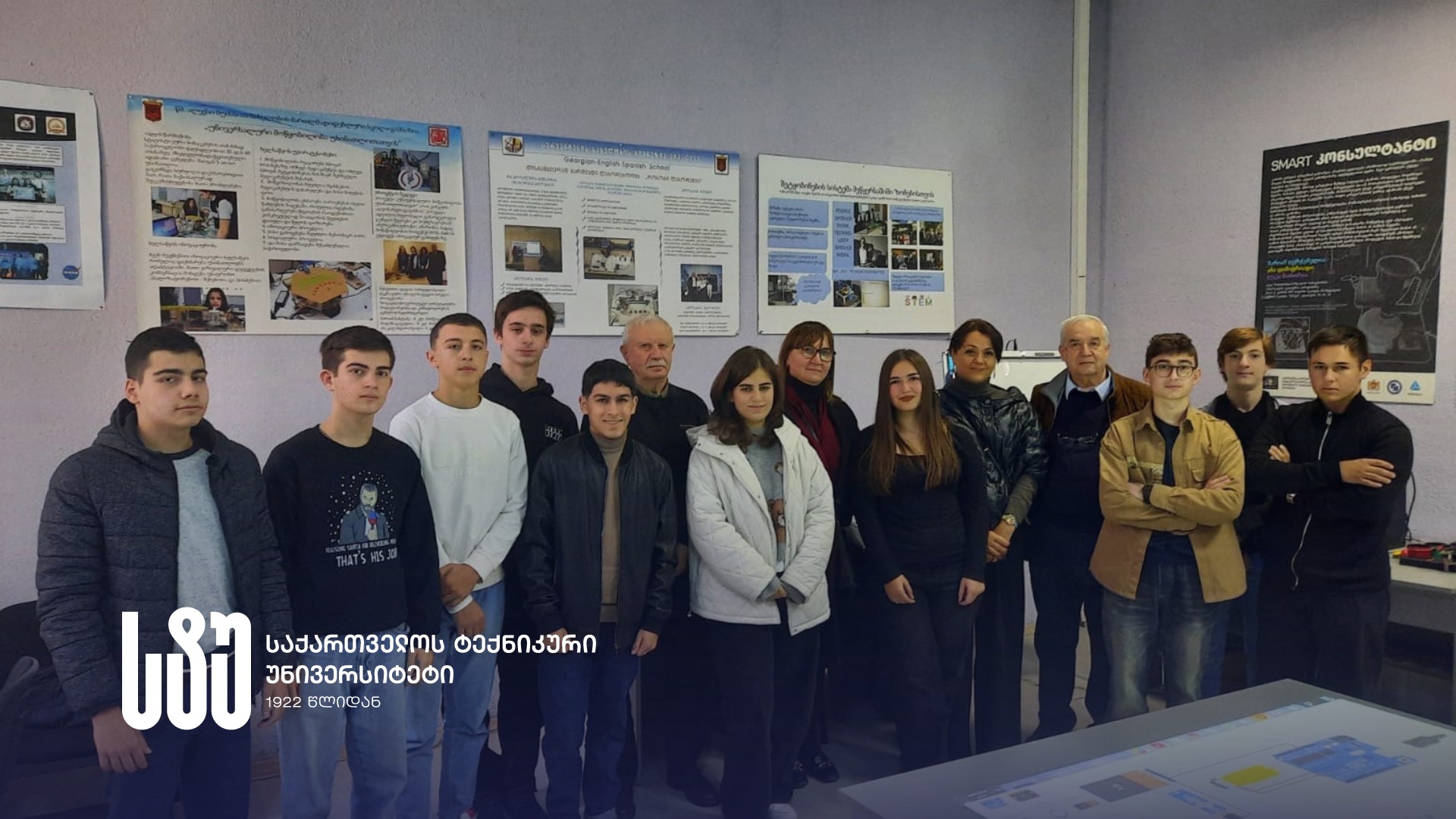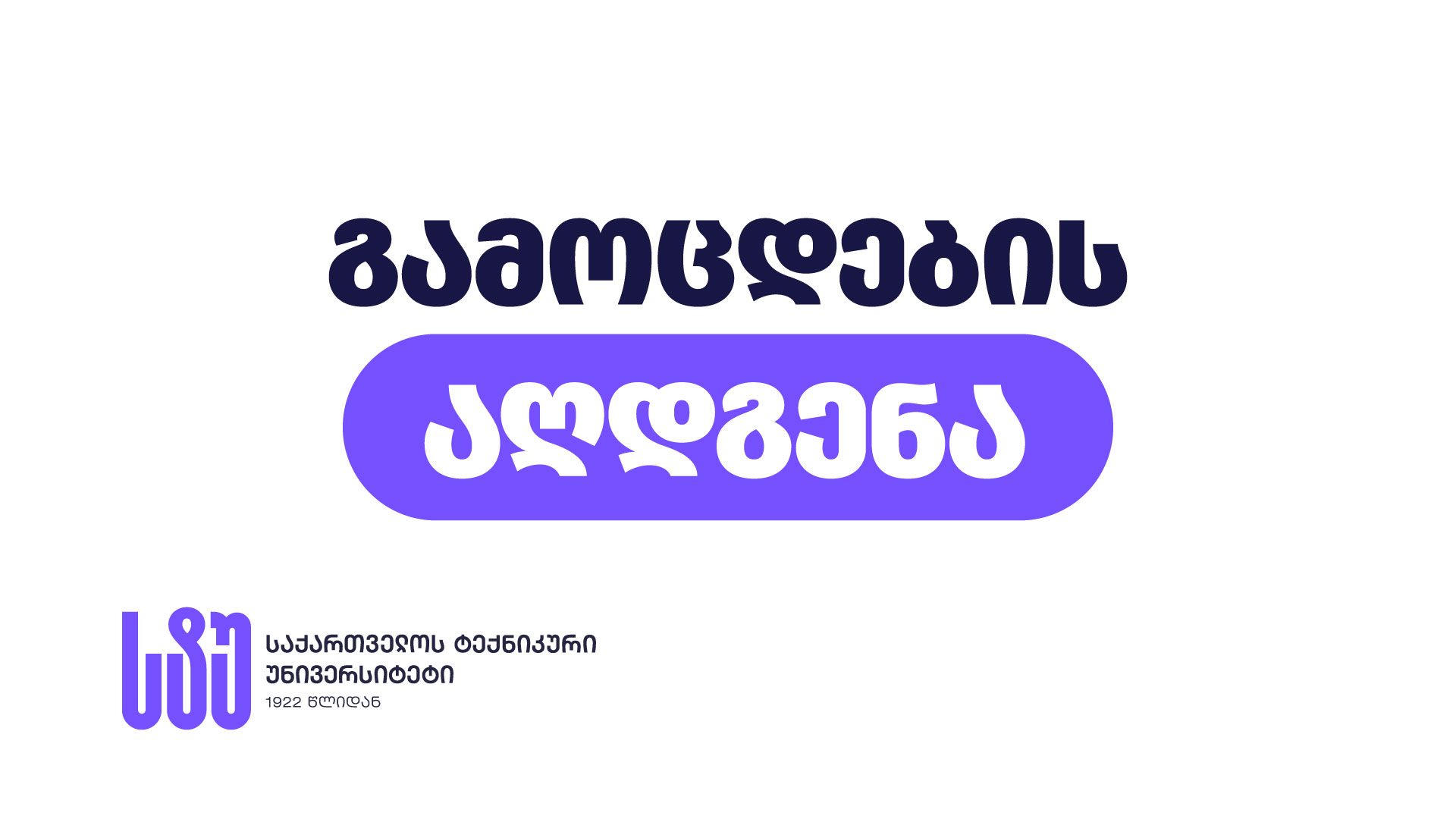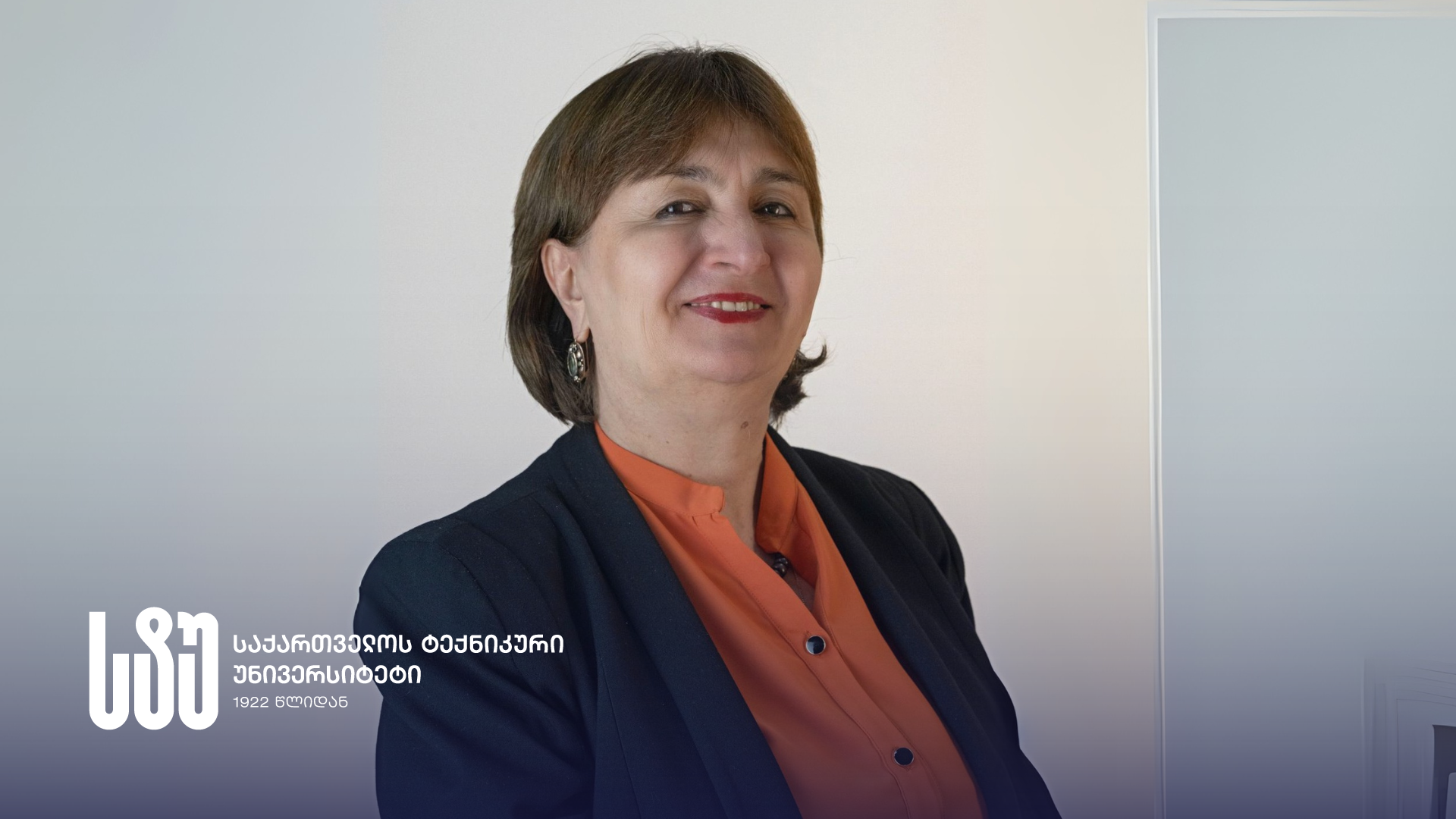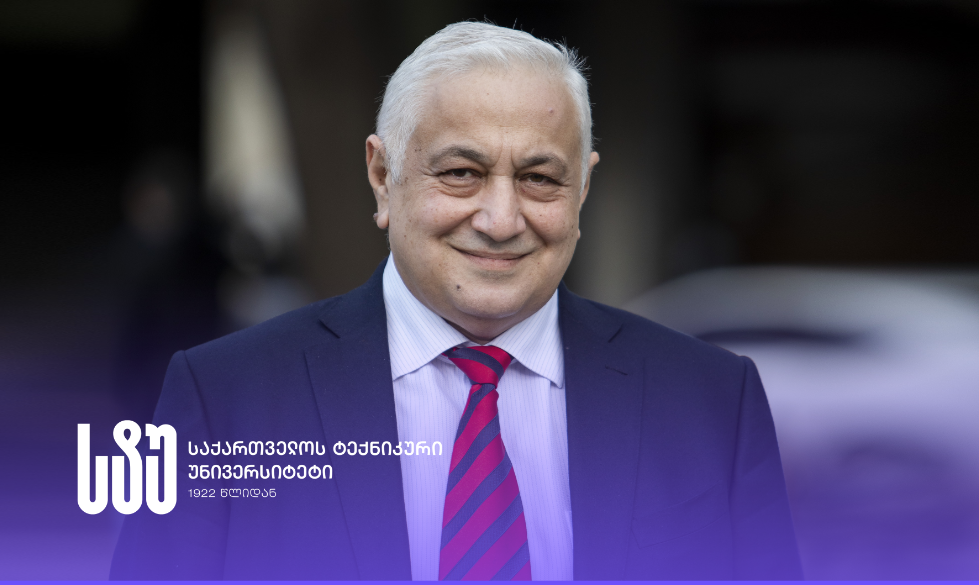Teams of GTU Students from the Virtual Modeling and Construction Center Prepare for the “Leonardo da Vinci” Final
09-11-2024
Based on the Virtual Modeling and Construction Center of the Engineering Physics Department of the Faculty of Informatics and Control Systems of the Georgian Technical University, six projects completed by student teams are the finalists of the competition for inventors and researchers of the Ministry of Education and Science of Georgia and the Shota Rustaveli National Science Foundation of Georgia – “Leonardo da Vinci”.
The Shota Rustaveli National Science Foundation of Georgia will announce the winners tomorrow, November 10th, International Science Day.
A day before, students of all six groups, with their mentors, conducted the last experiments at the GTU virtual modeling and construction center.
The GTU vice-rector, Professor Tamar Lominadze, and the dean of the faculty of Informatics and Control Systems, Professor Taliko Zhvania, got acquainted with the center’s working process.
According to the GTU vice-rector, the student teams based at the center of virtual modeling and construction participate in the competition “Leonardo da Vinci” annually, and in most cases, they take the prize places.
As Professor Tamar Lominadze stated, the final projects are SMART lift - a safe elevator system adaptable for disabled people (team of students: Davit Osefaishvili, Vakhtang Mgeladze, Makine Todua); Making wine in kvevri (a pitcher) using a high-tech method (team of students: Nikoloz Karbelashvili, Nino Sulamanidze, Yakob Avthandilashvili); River monitoring system (team of students: Saba Gulbiani, Giorgi Gabelia, Andria Kostava); Robot gardener (group of students: Davit Vakhtangadze, Lado Adamia, Mariam Vakhtangadze); An unmanned boat cleaning oil from water (team of students: Zviad Fruidze, Luka Forchkhidze, Elene Kachibaya, Luka Tsotsoria and Ana Saldadze) and an eco-friendly, smart fish farm (team of students: Giorgi Gobadze, Aleksandre Jelia, Nika Abuladze, Martha Todua, Elisabeth Gegeshidze).
“The purpose of the competition is to arouse the interest of teenagers in innovations and technical progress, to stimulate the learning process in general educational institutions, as well as to promote the development of creative thinking, research, and practical skills among students, and the project is carried out in two directions - scientific research and engineering.
The submitted competitive applications include the following scientific areas Chemistry, Biochemistry, Astronomy, Cosmology, Physics, Engineering Mechanics, Robotics, Artificial Intelligence, and others.
Participation in this competition is a great honor for each team, and reaching the final is already a victory, however, we are sure that the students of the Virtual Modeling and Construction Center will traditionally take the prize places.
I wish success to all six teams of the Virtual Modeling and Construction Center, the majority of whom are students of the STEM Academy, to the head of the center, Professor Davit Songhulashvili, and to Uta Kilasonia, a doctoral student of the Georgian Technical University, one of the mentors of the teams participating in the competition,” Tamar Lominadze said.
Vakhtang Mgeladze, member of the finalist group (SMART lift - safe elevator system adaptable for disabled persons): “The lift is adapted to disabled persons and is designed to prevent accidents. The elevator executes the voice command of the passenger and takes him/her to the indicated floor.
We have updated the evacuation plan, which is adapted for disabled people. Let’s say the elevator stopped between the floors, the power went out, or there was a fire, the alternating power automatically turns on, which takes the elevator to the nearest floor and automatically opens the door.”
Finalist team member Andria Kostava (river monitoring system): “We have created an early flood warning system that will be installed in the river at certain intervals. When the water level rises, the circuit is automatically closed, information is transmitted and data is displayed on the screen. Also, we have developed an application that instantly sends short text messages to residents. Our device allows constant control of the water level and does not require human intervention.”
Finalist group member Mariam Vakhtangadze (robot gardener): “The robot takes care of the plants, although it is a very different model from the existing one.
The robot takes care of the plants individually. It will be called by a plant that needs, say, water. The plant, through the device, sends a message to the robot, which finds it and delivers the dose of water that the plant needs. Also, the plant and the robot have a dialogue with each other, they talk.”
Nikoloz Karbelashvili, a member of the finalist group (making wine in a kvevri (a pitcher) using a high-tech method): “It is our team member Yakob Avthandilashvili’s idea. Our model is fixed on the Kvevri (pitcher’s) head, it has no contact with the wine. Through it, it is possible to control the wine process remotely, automatically, without human intervention. There is no such device for pitchers, this is brand new.”
The Shota Rustaveli National Science Foundation of Georgia will announce the winners tomorrow, November 10th, International Science Day.
A day before, students of all six groups, with their mentors, conducted the last experiments at the GTU virtual modeling and construction center.
The GTU vice-rector, Professor Tamar Lominadze, and the dean of the faculty of Informatics and Control Systems, Professor Taliko Zhvania, got acquainted with the center’s working process.
According to the GTU vice-rector, the student teams based at the center of virtual modeling and construction participate in the competition “Leonardo da Vinci” annually, and in most cases, they take the prize places.
As Professor Tamar Lominadze stated, the final projects are SMART lift - a safe elevator system adaptable for disabled people (team of students: Davit Osefaishvili, Vakhtang Mgeladze, Makine Todua); Making wine in kvevri (a pitcher) using a high-tech method (team of students: Nikoloz Karbelashvili, Nino Sulamanidze, Yakob Avthandilashvili); River monitoring system (team of students: Saba Gulbiani, Giorgi Gabelia, Andria Kostava); Robot gardener (group of students: Davit Vakhtangadze, Lado Adamia, Mariam Vakhtangadze); An unmanned boat cleaning oil from water (team of students: Zviad Fruidze, Luka Forchkhidze, Elene Kachibaya, Luka Tsotsoria and Ana Saldadze) and an eco-friendly, smart fish farm (team of students: Giorgi Gobadze, Aleksandre Jelia, Nika Abuladze, Martha Todua, Elisabeth Gegeshidze).
“The purpose of the competition is to arouse the interest of teenagers in innovations and technical progress, to stimulate the learning process in general educational institutions, as well as to promote the development of creative thinking, research, and practical skills among students, and the project is carried out in two directions - scientific research and engineering.
The submitted competitive applications include the following scientific areas Chemistry, Biochemistry, Astronomy, Cosmology, Physics, Engineering Mechanics, Robotics, Artificial Intelligence, and others.
Participation in this competition is a great honor for each team, and reaching the final is already a victory, however, we are sure that the students of the Virtual Modeling and Construction Center will traditionally take the prize places.
I wish success to all six teams of the Virtual Modeling and Construction Center, the majority of whom are students of the STEM Academy, to the head of the center, Professor Davit Songhulashvili, and to Uta Kilasonia, a doctoral student of the Georgian Technical University, one of the mentors of the teams participating in the competition,” Tamar Lominadze said.
Vakhtang Mgeladze, member of the finalist group (SMART lift - safe elevator system adaptable for disabled persons): “The lift is adapted to disabled persons and is designed to prevent accidents. The elevator executes the voice command of the passenger and takes him/her to the indicated floor.
We have updated the evacuation plan, which is adapted for disabled people. Let’s say the elevator stopped between the floors, the power went out, or there was a fire, the alternating power automatically turns on, which takes the elevator to the nearest floor and automatically opens the door.”
Finalist team member Andria Kostava (river monitoring system): “We have created an early flood warning system that will be installed in the river at certain intervals. When the water level rises, the circuit is automatically closed, information is transmitted and data is displayed on the screen. Also, we have developed an application that instantly sends short text messages to residents. Our device allows constant control of the water level and does not require human intervention.”
Finalist group member Mariam Vakhtangadze (robot gardener): “The robot takes care of the plants, although it is a very different model from the existing one.
The robot takes care of the plants individually. It will be called by a plant that needs, say, water. The plant, through the device, sends a message to the robot, which finds it and delivers the dose of water that the plant needs. Also, the plant and the robot have a dialogue with each other, they talk.”
Nikoloz Karbelashvili, a member of the finalist group (making wine in a kvevri (a pitcher) using a high-tech method): “It is our team member Yakob Avthandilashvili’s idea. Our model is fixed on the Kvevri (pitcher’s) head, it has no contact with the wine. Through it, it is possible to control the wine process remotely, automatically, without human intervention. There is no such device for pitchers, this is brand new.”


